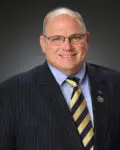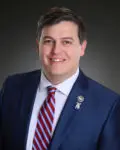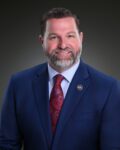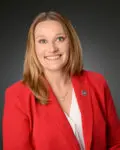In the words of Humphrey Bogart in the famed movie Casablanca, “Here’s looking at you, kid.” The 2024 legislative session was the third session of the year. By the end, everyone should have been sufficiently worn out. That’s true for legislators and transparency hawks alike. In addition, the last 48 hours of a session are usually when all the dirty tricks come out. Some good legislators suddenly plied parliamentary rules to get a few rusty bills across the finish line. Unfortunately, the more nefarious legislators will try to turn the last-minute rush to their advantage.
We watched a few of them try to sneak items across the line while others were perhaps not paying the closest attention. Thankfully, some vigilant members prevented several last-minute resolutions from damaging the reputation of the Department of Education’s head, Dr. Cade Brumley. However, the chamber’s attention waxes and wanes throughout the process, not just at the end. Good legislators know this and can “read the room,” so to speak. Bad bills and amendments get through easily when the mood is favorable to pass nearly anything. Other times, we may see a good bill inexplicably returned to the calendar because the mood in the chamber isn’t conducive.
These summaries address the number of bills authored and passed by this year’s freshman class. However, quality over quantity is a good rule of thumb for legislators – especially new ones.
New scorecard features
We’ll provide a broader update on our legislative scorecard improvements in a future article. As a reminder, this article addresses brand-new legislators. Most of them will start at a rating of six. Those numbers will probably move significantly as we unpack this session over the next few weeks. While a few scores have already been updated, they aren’t necessarily permanent.
One new feature you should pay particular attention to is a scientific comparison of all legislators. We call it “votes like.” It’s a percentage similarity between lawmakers. We analyzed all 2,907 floor votes cast in the legislature to accomplish this feat. That data determined who voted most like whom. I found the results fascinating because they reveal the political leanings of the freshmen. This new feature has already been applied to all member scorecards. So, even if your legislator is not a freshman, check out your representative or senator to see who they vote like. If, like me, you’re wondering how our freshmen did, the rest of this article is for you.
Off to a roaring start!
 Roger Wilder came out swinging. Of six (6) instruments he authored, two (2) made it to the governor’s desk. Both of those bills were declared “highly controversial” by the legacy media. His HB608 “What is a woman?” bill appeared with a whopping sixty-two (62) co-authors. When it finally passed both chambers, those co-authors grew to seventy-eight (78)!
Roger Wilder came out swinging. Of six (6) instruments he authored, two (2) made it to the governor’s desk. Both of those bills were declared “highly controversial” by the legacy media. His HB608 “What is a woman?” bill appeared with a whopping sixty-two (62) co-authors. When it finally passed both chambers, those co-authors grew to seventy-eight (78)!
HB156, if signed by the governor, would remove the mandate that work-permitted minors be required to take a thirty-minute (30) lunch break. Oh, the legacy activist media hated that one! Spin as they might, they couldn’t stop it from passing. For clarity, this doesn’t mean employers take away a work-permitted employee’s lunch break. It simply removes the mandate, allowing workers to choose whether or not they want to take an unpaid, half-hour break.
As expected, Wilder’s similar voting representatives include strong conservatives like Jay Galle (92.12%), Julie Emerson (91.84%), Charles “Chuck” Owen (91.64%), Emily Chenevert (91.41%), and Josh Carlson (90.71%).
 Josh Carlson is someone in the legislature who’s fought alongside us in the same foxholes. Like us, he was sued by a bunch of library nuts. Had they not picked a fight with him, perhaps he wouldn’t have brought HB974 removing the MLIS requirement for library directors. That bill was amended to include Jay Galle’s HB946, which clarifies that parish governing authorities may remove library board members at will. Another fabulous bill, HB977, would have significantly modernized public notices statewide. Unfortunately, government-created monopolies successfully watered this bill down considerably along the way. Here’s hoping we see another iteration of this one in the next session.
Josh Carlson is someone in the legislature who’s fought alongside us in the same foxholes. Like us, he was sued by a bunch of library nuts. Had they not picked a fight with him, perhaps he wouldn’t have brought HB974 removing the MLIS requirement for library directors. That bill was amended to include Jay Galle’s HB946, which clarifies that parish governing authorities may remove library board members at will. Another fabulous bill, HB977, would have significantly modernized public notices statewide. Unfortunately, government-created monopolies successfully watered this bill down considerably along the way. Here’s hoping we see another iteration of this one in the next session.
Carlson’s five closest “votes like” include conservatives like Roger Wilder (90.71%), Emily Chenevert (89.88%), Julie Emerson (89.69%), Gabe Firment (88.7%), and Jay Galle (87.96%).
 Kimberly Landry Coates is probably the biggest surprise of the session. Five of her twelve instruments made it to the governor’s desk. However, one bill in particular was different. She dared to bring HB467, dubbed the “Raw Milk Bill,” which had been attempted over and over for a decade or more. As such, at the beginning of the session, few took it seriously. We were told it didn’t have the votes at every step. However, something unexplainable happened. The bill passed every hurdle overwhelmingly. How many times does a “controversial” bill pass unanimously? Well, it happened with Kim Coates!
Kimberly Landry Coates is probably the biggest surprise of the session. Five of her twelve instruments made it to the governor’s desk. However, one bill in particular was different. She dared to bring HB467, dubbed the “Raw Milk Bill,” which had been attempted over and over for a decade or more. As such, at the beginning of the session, few took it seriously. We were told it didn’t have the votes at every step. However, something unexplainable happened. The bill passed every hurdle overwhelmingly. How many times does a “controversial” bill pass unanimously? Well, it happened with Kim Coates!
Representatives who voted most similarly to Coates are Phillip DeVillier (93.73%), Shane Mack (93.51%), Stephanie Berault (93.26%), Tony Bacala (93.23%), and Dennis Bamburg (92.87%).
 Jay Galle authored HB946, a revival of another library bill concept by his predecessor, Paul Hollis. Like Hollis’s bill, Galle’s failed to get through. However, using some parliamentary rules magic, it was revived as an amendment to Josh Carlson’s HB974 as it crossed the final hurdle on its way to the governor’s desk. He also authored HB383, which removes the liability of automobile drivers who hit protestors attempting to block traffic. While legislatively quiet during this session, Galle was fun to watch. He’s one of those team player types that’s really going to bloom in the next session.
Jay Galle authored HB946, a revival of another library bill concept by his predecessor, Paul Hollis. Like Hollis’s bill, Galle’s failed to get through. However, using some parliamentary rules magic, it was revived as an amendment to Josh Carlson’s HB974 as it crossed the final hurdle on its way to the governor’s desk. He also authored HB383, which removes the liability of automobile drivers who hit protestors attempting to block traffic. While legislatively quiet during this session, Galle was fun to watch. He’s one of those team player types that’s really going to bloom in the next session.
Similar voting legislators to Galle include conservative representatives like Peter Egan (93.14%), Roger Wilder (92.12%), Julie Emerson (91.36%), Raymond Crews (90.74%), and Kellee Dickerson (90.25%).
More excellent work
 Kellee Hennessy Dickerson from Livingston Parish authored seven (7) instruments, and three (3) reached the Governor’s desk. She authored perhaps the single most significant bill this session, HB777. Her bill would have ended taxpayer funding of an organization that promotes the interspersing of erotic books in the public library children’s section. Unfortunately, the Leftists in the Municipal Affairs Committee violated multiple procedural rules to “kill that bi**h.”
Kellee Hennessy Dickerson from Livingston Parish authored seven (7) instruments, and three (3) reached the Governor’s desk. She authored perhaps the single most significant bill this session, HB777. Her bill would have ended taxpayer funding of an organization that promotes the interspersing of erotic books in the public library children’s section. Unfortunately, the Leftists in the Municipal Affairs Committee violated multiple procedural rules to “kill that bi**h.”
Another outstanding bill she authored that’s now on the governor’s desk is HB737. It forbids the Leftists’ recent practice of protesting in front of private homes. As a former school board member, she must be particularly proud of HB644. It allows home school students to participate in parish school system sports programs.
The votes-like list for Dickerson is among the strongest I’ve seen in our analysis. It includes Julie Emerson (90.27%), Jay Galle (90.25%), Roger Wilder (89.21%), Charles “Chuck” Owen (89.18%), and Peter Egan (88.27%).
 Peter Egan is the representative with a hint of an Irish accent (and the ladies can’t get enough of it). Five (5) of his eleven (11) instruments made it to the governor’s desk. Most of his bills concerned veterans’ matters, although there were a few about controlled substances. Egan added a noticeable conservative presence in committee meetings this session.
Peter Egan is the representative with a hint of an Irish accent (and the ladies can’t get enough of it). Five (5) of his eleven (11) instruments made it to the governor’s desk. Most of his bills concerned veterans’ matters, although there were a few about controlled substances. Egan added a noticeable conservative presence in committee meetings this session.
Egan’s votes-like list is also exclusively conservative. It includes Jay Galle (93.14%), Raymond Crews (89.4%), Julie Emerson (89.27%), Roger Wilder (88.3%), and Kellee Dickerson (88.27%).
 Representative and EBR Mom’s for Liberty chapter founder Emily Chenevert had one of four bills pass to the governor’s desk. HB904 requires the Department of Education and Board of Regents school-level reporting on using DEI (Diversity, Equity, and Inclusion) programs. While it doesn’t end the practice in our schools, it requires disclosure. Like our flashlight analogy, the fact that people are now looking may be all that’s necessary to ultimately solve the problem.
Representative and EBR Mom’s for Liberty chapter founder Emily Chenevert had one of four bills pass to the governor’s desk. HB904 requires the Department of Education and Board of Regents school-level reporting on using DEI (Diversity, Equity, and Inclusion) programs. While it doesn’t end the practice in our schools, it requires disclosure. Like our flashlight analogy, the fact that people are now looking may be all that’s necessary to ultimately solve the problem.
Some of the other legislators that Chenevert votes most like include conservative stalwarts Roger Wilder (91.41%), Julie Emerson (91.29%), Michael Melerine (91.26%), Charles “Chuck” Owen (91.11%), and seatmate Dodie Horton (90.54%).
 Attorney Brian Glorioso, also from St. Tammany Parish, had eleven (11) instruments. Five of these made it to the governor’s desk, one of which has already been signed. The most notable was HB205, which adds several modern methods of protest to the definition of racketeering. The bill includes much of what we see on the evening news described as “firey but mostly peaceful” protests. Although none of his bills reflect it, he has also been a fantastic ally in reducing public library employees’ capacity to use public resources to engage in social justice battles.
Attorney Brian Glorioso, also from St. Tammany Parish, had eleven (11) instruments. Five of these made it to the governor’s desk, one of which has already been signed. The most notable was HB205, which adds several modern methods of protest to the definition of racketeering. The bill includes much of what we see on the evening news described as “firey but mostly peaceful” protests. Although none of his bills reflect it, he has also been a fantastic ally in reducing public library employees’ capacity to use public resources to engage in social justice battles.
Glorioso appears to be voting pretty tight with other representatives in his geographic area. The top ones include Stephanie Berault (89.58%), Mike Bayham (89.03%), seatmate Jeff Wiley (88.89%), Dennis Bamburg (88.68%), and Kim Carver (88.56%).
Great stuff!
 Former Washington Parish School Board member John Wyble had lucky thirteen (13) instruments. Three (3) of them made it through the process and have already been signed by the governor. As expected, two of these bills address education matters. HB112 requires that school systems consider student achievement a criterion for evaluating a superintendent. Also, HB188 adds to the qualifications of a school board member. Without cracking open all of the statutes referenced, this bill appears to disqualify anyone convicted or plead no contest to a crime involving minors. It’s an outstanding common-sense bill that could be categorized under, “Wow, why didn’t I think of that?”
Former Washington Parish School Board member John Wyble had lucky thirteen (13) instruments. Three (3) of them made it through the process and have already been signed by the governor. As expected, two of these bills address education matters. HB112 requires that school systems consider student achievement a criterion for evaluating a superintendent. Also, HB188 adds to the qualifications of a school board member. Without cracking open all of the statutes referenced, this bill appears to disqualify anyone convicted or plead no contest to a crime involving minors. It’s an outstanding common-sense bill that could be categorized under, “Wow, why didn’t I think of that?”
The five representatives who voted most similar to Wyble this session include Kim Carver (94.43%), Stephanie Berault (93.49%), Jessica Domangue (92.06%), Beau Beaullieu (91.76%), and Vincent St. Blanc (91.58%).
 Lauren Ventrella had thirteen instruments, two of which made it to the governor. The strongest was HB819, which shifts the burden of proof of self-defense from a concealed carry permit-holding defendant to the plaintiff. This strengthens the protections for trained concealed carry holders compared with constitutional carry holders. If you’ve been wondering whether or not to renew your concealed carry permit, this bill provides a great incentive.
Lauren Ventrella had thirteen instruments, two of which made it to the governor. The strongest was HB819, which shifts the burden of proof of self-defense from a concealed carry permit-holding defendant to the plaintiff. This strengthens the protections for trained concealed carry holders compared with constitutional carry holders. If you’ve been wondering whether or not to renew your concealed carry permit, this bill provides a great incentive.
Ventrella’s similar legislator list includes her seatmate Chad Boyer (93.41%), Michael Echols (90.5%), Troy Romero (89.91%), Jacob Landry (89.83%), and Foy Gadberry (89.54%).
 Michael Melerine is another freshman legislator who brought some substantial bills. We mentioned him previously in a short video podcast. He authored more than thirty (30) instruments for this session. Five of those bills have already been signed by the governor, and another four (4) are sitting on the governor’s desk. Melerine is also my bellwether for a variety of education-related bills.
Michael Melerine is another freshman legislator who brought some substantial bills. We mentioned him previously in a short video podcast. He authored more than thirty (30) instruments for this session. Five of those bills have already been signed by the governor, and another four (4) are sitting on the governor’s desk. Melerine is also my bellwether for a variety of education-related bills.
The five members who voted most like Melerine this session were Jacob Landry (92.2%), Emily Chenevert (91.26%), Jason DeWitt (90.66%), Beau Beaullieu (90.42%), and Troy Romero (90.29%).
 Beth Billings had two of her five bills pass. The governor has already signed one; another is on his desk concerning election-related matters. HB570 addresses rules surrounding a voter’s change in party affiliation. HB962 tweaks the process used to prepare, verify, tabulate, and count absentee by mail and early voting ballots.
Beth Billings had two of her five bills pass. The governor has already signed one; another is on his desk concerning election-related matters. HB570 addresses rules surrounding a voter’s change in party affiliation. HB962 tweaks the process used to prepare, verify, tabulate, and count absentee by mail and early voting ballots.
Five members who voted most like Billings are Beau Beaullieu (92.56%), Tony Bacala (92.41%), Vincent St. Blanc (92.41%), Daryl Deshotel (91.96%), and Dewith Carrier (91.93%).
Hard-working
 Brach Myers from the Lafayette area had eleven (11) instruments. Five made it to the governor’s desk, and two have already been signed. One of his most talked-about bills was HB853, which created the Office of the Surgeon General at the Louisiana Department of Health. That one hasn’t been signed just yet. His other bills seem to address various remote medical or mental care aspects. This isn’t surprising in the post-COVID era, especially considering Myers’s medical services industry expertise. Myers’s vote is frequently one of my gauges for healthcare-related bills.
Brach Myers from the Lafayette area had eleven (11) instruments. Five made it to the governor’s desk, and two have already been signed. One of his most talked-about bills was HB853, which created the Office of the Surgeon General at the Louisiana Department of Health. That one hasn’t been signed just yet. His other bills seem to address various remote medical or mental care aspects. This isn’t surprising in the post-COVID era, especially considering Myers’s medical services industry expertise. Myers’s vote is frequently one of my gauges for healthcare-related bills.
His votes like mix include Christopher Turner (92.61%), Troy Hebert (92.21%), Wayne McMahen (92.17%), Stephanie Berault (92.08%), and Kim Carver (91.69%).
 Michael Bayham, you’ll recall, is a regular contributor to the Hayride. Bayham brought an eye-watering sixty (60) instruments in his first session. Eleven (11) made it to the governor’s desk, three (3) of which have already been signed. He comes from Chalmette, which is very near New Orleans. The biggest issue in that part of the state is crime. As such, the bulk of Bayham’s bills involve crime and punishment.
Michael Bayham, you’ll recall, is a regular contributor to the Hayride. Bayham brought an eye-watering sixty (60) instruments in his first session. Eleven (11) made it to the governor’s desk, three (3) of which have already been signed. He comes from Chalmette, which is very near New Orleans. The biggest issue in that part of the state is crime. As such, the bulk of Bayham’s bills involve crime and punishment.
As a legislator, Bayham voted most like Wayne McMahen (91.06%), Ryan Bourriaque (90.8%), Jack McFarland (90.54%), Jessica Domangue (90.54%), and Vincent St. Blanc (90.45%).
 Dixon McMakin comes to us from East Baton Rouge. He also went to the legislature with much on his mind, filing twenty-five (25) instruments in total. Eight of those bills landed on Governor Jeff Landry’s desk. The most controversial of his successful bills was HB97, which expanded solicitation prohibitions. Before looking to Mandie Landry for a reaction, know that this bill is about panhandling, not Mandie’s kind of solicitation. He also annoyed AG Liz Murrill by authoring HB756, which would have repurposed a floor of her space in the capitol building to create more legislator offices. Although it managed to find its way out of the House, the Senate smartly swept it into oblivion.
Dixon McMakin comes to us from East Baton Rouge. He also went to the legislature with much on his mind, filing twenty-five (25) instruments in total. Eight of those bills landed on Governor Jeff Landry’s desk. The most controversial of his successful bills was HB97, which expanded solicitation prohibitions. Before looking to Mandie Landry for a reaction, know that this bill is about panhandling, not Mandie’s kind of solicitation. He also annoyed AG Liz Murrill by authoring HB756, which would have repurposed a floor of her space in the capitol building to create more legislator offices. Although it managed to find its way out of the House, the Senate smartly swept it into oblivion.
McMakin’s closest votes-like representatives are Michael Echols (90.05%), Jacob Landry (89.04%), Troy Romero (88.58%), Charles “Chuck” Owen (88.55%), and Jason DeWitt (88.42%).
 Former Livingston Parish Councilman Shane Mack had eleven (11) instruments this session. Livingston Parish is in an uproar over a controversial Biden-esque Green New Deal program at Lake Maurepas regarding Carbon Capture and Sequestration. One of Mack’s several bills related to this matter (HB516) was sent to the governor’s desk. As of this writing, it has not yet been signed.
Former Livingston Parish Councilman Shane Mack had eleven (11) instruments this session. Livingston Parish is in an uproar over a controversial Biden-esque Green New Deal program at Lake Maurepas regarding Carbon Capture and Sequestration. One of Mack’s several bills related to this matter (HB516) was sent to the governor’s desk. As of this writing, it has not yet been signed.
The five legislators who vote most like Mack include Kimberly Coates (93.51%), Dennis Bamburg (92.25%), Tony Bacala (91.91%), Paula Davis (91.14%), and Francis Thompson (91.13%).
Sticking with it
 Stephanie Berault is from the Slidell area. Of her seven (7) instruments this session, the only one to get to Jeff Landry’s desk was HB152. It creates a community development district in St. Tammany Parish. Another one of her bills, HB440, almost made it to the finish line but was returned to the calendar in the Senate and never called up again. That one was related to association documents for planned communities.
Stephanie Berault is from the Slidell area. Of her seven (7) instruments this session, the only one to get to Jeff Landry’s desk was HB152. It creates a community development district in St. Tammany Parish. Another one of her bills, HB440, almost made it to the finish line but was returned to the calendar in the Senate and never called up again. That one was related to association documents for planned communities.
The other representatives she voted most similarly to include seatmate Kim Carver (95.48%), John Wyble (93.49%), Kimberly Coates (93.26%), Vincent St. Blanc (93.23%), and Jessica Domangue (93.22%).
 Jacob Landry from Iberia Parish came into the legislature with a unique perspective. Rather than authoring any bills on his own, he started out wanting to focus on learning the people and processes of the legislature. He did author one commendation for Drew Brees upon his induction into the Hall of Fame. However, Landry also worked closely with Beau Beaullieu to reduce the state’s severance tax on oil and gas. HB418 appears to have cut the severance tax rate in half for numerous well types. The fiscal note puts that tax reduction at about $900,000. However, the more significant severance tax reduction bill HB259 was never scheduled by Senate Revenue and Fiscal Affairs Committee chairman Franklin Foil. That one would have reduced the tax burden on the oil and gas industry by tens of millions of dollars!
Jacob Landry from Iberia Parish came into the legislature with a unique perspective. Rather than authoring any bills on his own, he started out wanting to focus on learning the people and processes of the legislature. He did author one commendation for Drew Brees upon his induction into the Hall of Fame. However, Landry also worked closely with Beau Beaullieu to reduce the state’s severance tax on oil and gas. HB418 appears to have cut the severance tax rate in half for numerous well types. The fiscal note puts that tax reduction at about $900,000. However, the more significant severance tax reduction bill HB259 was never scheduled by Senate Revenue and Fiscal Affairs Committee chairman Franklin Foil. That one would have reduced the tax burden on the oil and gas industry by tens of millions of dollars!
Representatives who voted most like Landry include veterans like Daryl Deshotel (93.3%), Beau Beaullieu (92.64%), Michael Echols (92.61%), Vincent St. Blanc (92.19%), and freshman Michael Melerine (92.2%).
 Chance Henry from Crowley, in Acadia Parish, had a lucky seven (7) instruments. Henry is in the insurance industry, so his knowledge on this topic resulted in three bills going to the governor’s desk, with two already signed. The most significant, as gauged by the number of pages, is HB399, which changes insurance reporting requirements to the Department of Insurance. The other two bills, HB605 and HB658, add electronic to other notifications to or from the State of Louisiana – as it relates to insurance.
Chance Henry from Crowley, in Acadia Parish, had a lucky seven (7) instruments. Henry is in the insurance industry, so his knowledge on this topic resulted in three bills going to the governor’s desk, with two already signed. The most significant, as gauged by the number of pages, is HB399, which changes insurance reporting requirements to the Department of Insurance. The other two bills, HB605 and HB658, add electronic to other notifications to or from the State of Louisiana – as it relates to insurance.
Other representatives who voted like Henry were also freshmen. These include Vincent St. Blanc (93.55%), Timothy Kerner (93.29%), Dennis Bamburg (93.26%), Troy Romero (93.0%), and Troy Hebert (92.91%).
 Troy Hebert of Vermilion Parish authored five instruments. The governor has already signed two bills. HB311 adds an additional manual to the insurance license testing requirements. HB839 changes the prescription benefits for ventilators.
Troy Hebert of Vermilion Parish authored five instruments. The governor has already signed two bills. HB311 adds an additional manual to the insurance license testing requirements. HB839 changes the prescription benefits for ventilators.
Hebert’s top five votes-like representatives include Jessica Domangue (93.1%), Chance Henry (92.91%), Beau Beaullieu (92.82%), Stephanie Berault (92.59%), and Brach Myers (92.21%). With one exception, all these legislators are in the greater Acadiana area.
Still going
 Breaux Bridge’s own Chad “two votes” Boyer (pronounced Boy-yay) brought a lucky thirteen (13) instruments. Of six that made their way to the Governor’s desk, one has been signed. Boyer appears to have replaced Page Cortez as the Legislature’s resident horse racing enthusiast, as three of his bills (HB131, HB840, and HB932) relate to the sport.
Breaux Bridge’s own Chad “two votes” Boyer (pronounced Boy-yay) brought a lucky thirteen (13) instruments. Of six that made their way to the Governor’s desk, one has been signed. Boyer appears to have replaced Page Cortez as the Legislature’s resident horse racing enthusiast, as three of his bills (HB131, HB840, and HB932) relate to the sport.
Those legislators with the most similar votes to Boyer include his seatmate Lauren Ventrella (93.41%), Chance Henry (92.24%), Vincent St. Blanc (91.96%), Daryl Deshotel (91.62%), and Troy Romero (91.45%).
 Republican Attorney Jacob Braud from Belle Chase, Louisiana, has twelve (12) instruments this session. Five (5) of the six (6) bills that have made it to the governor’s desk are already signed into law. Two non-local bills stand out. HB651 tightens up some language around insurance fraud, expanding some things and contracting others. HB791 appears to remove the sunset date of the Attorney General’s enforcement power over certain insurance fraud violations, known colloquially as the Sledge Jeansonne Louisiana Insurance Fraud Prevention Act.
Republican Attorney Jacob Braud from Belle Chase, Louisiana, has twelve (12) instruments this session. Five (5) of the six (6) bills that have made it to the governor’s desk are already signed into law. Two non-local bills stand out. HB651 tightens up some language around insurance fraud, expanding some things and contracting others. HB791 appears to remove the sunset date of the Attorney General’s enforcement power over certain insurance fraud violations, known colloquially as the Sledge Jeansonne Louisiana Insurance Fraud Prevention Act.
His seatmate Jessica Domangue (92.09%), Stephanie Hilferty (90.07%), Timothy Kerner (88.93%), Stephanie Berault (88.85%), and Mike Bayham (88.73%) are voting most like Braud.
 Insurance agent Dennis Bamburg, Jr. from Bossier had ten (10) instruments this session. Two (2) of the three (3) that made it to the governor’s desk have been signed. One that has turned out to be quite controversial is his HB762. It meddles in the space held by BESE (the Board of Elementary and Secondary Education). Liberty-minded conservatives like this bill because it opposes a mandate. Specifically, it states that the Department of Education shall not require every student to take the ACT. However, the governing board of the Department of Education (BESE) has asked Jeff Landry to veto it.
Insurance agent Dennis Bamburg, Jr. from Bossier had ten (10) instruments this session. Two (2) of the three (3) that made it to the governor’s desk have been signed. One that has turned out to be quite controversial is his HB762. It meddles in the space held by BESE (the Board of Elementary and Secondary Education). Liberty-minded conservatives like this bill because it opposes a mandate. Specifically, it states that the Department of Education shall not require every student to take the ACT. However, the governing board of the Department of Education (BESE) has asked Jeff Landry to veto it.
When judging a bill like this, looking to the legislator with the most experience in the space is wise. My best fit is former BESE member and freshman legislator Michael Melerine, who voted against the bill. It may also be noteworthy that the bill was passed by only two votes in the House.
Bamburg’s similarly voting legislators include Vincent St. Blanc (93.39%), Chance Henry (93.26%), Paula Davis (93.0%), Kimberly Coates (92.87%), and Foy Gadberry (92.69%).
 Chris “Kim” Carver, a banker from the Mandeville area, had eleven (11) instruments this session. Eight (8) of those made it to the governor’s desk, and two resolutions passed, leaving only one failed instrument. A few examples that jump out include HB78 for charter school applications to the BESE board, HB335, which adds school resource officers to the list of people who are required to report suspected child abuse, and HB577, which forbids the online tracking of minors for purposes of advertising.
Chris “Kim” Carver, a banker from the Mandeville area, had eleven (11) instruments this session. Eight (8) of those made it to the governor’s desk, and two resolutions passed, leaving only one failed instrument. A few examples that jump out include HB78 for charter school applications to the BESE board, HB335, which adds school resource officers to the list of people who are required to report suspected child abuse, and HB577, which forbids the online tracking of minors for purposes of advertising.
His five “most like” legislators are seatmate Stephanie Berault (95.48%), John Wyble (94.43%), Vincent St. Blanc (92.99%), Mark Wright (92.66%), and Kimberly Coates (92.61%).
A little spicy!
 Jessica Domangue was a somewhat supercilious and curiously surprising legislator in this session. Four of her seven (7) instruments made it to the governor. HB67 was probably her most notorious bill. It expanded special concealed firearm privileges to various elected officials. Many believe elected officials shouldn’t have more “rights” than the citizens they purport to serve. As such, Danny McCormick attempted two significant liberty amendments that were promptly defeated. Amendment 3448 would have extended the same firearm privileges to every citizen. It failed 33:61. He then offered amendment 3449 to allow teachers with rigorous firearm training to conceal carry at schools. Surprisingly, nearly all legislators prefer the current ban on trained teachers protecting our children at school.
Jessica Domangue was a somewhat supercilious and curiously surprising legislator in this session. Four of her seven (7) instruments made it to the governor. HB67 was probably her most notorious bill. It expanded special concealed firearm privileges to various elected officials. Many believe elected officials shouldn’t have more “rights” than the citizens they purport to serve. As such, Danny McCormick attempted two significant liberty amendments that were promptly defeated. Amendment 3448 would have extended the same firearm privileges to every citizen. It failed 33:61. He then offered amendment 3449 to allow teachers with rigorous firearm training to conceal carry at schools. Surprisingly, nearly all legislators prefer the current ban on trained teachers protecting our children at school.
Another controversial move she made was an amendment that attempted to change fifty (50) years of statutory precedent. Since the 1970s, individuals have been able to opt themselves or their children out of vaccinations for any reason or no reason. Her amendment added a burdensome requirement of a doctor’s written excuse. Ultimately, the Senate smartly stripped out that amendment.
Domnangue had an unpredictable mix of excellent and bad votes in committee. As far as floor action, legislators who vote most similarly to Domangue are Stephanie Berault (93.22%), Troy Hebert (93.1%), Paula Davis (92.58%), Timothy Kerner (92.24%), and Vincent St. Blanc (92.15%).
 Republican Vincent Cox, who flipped a seat into the “R” column, has been … well, odd. His HB542 creates new penalties for running red lights. Then there’s HB309, which raised the maximum hourly wage for bingo callers from $15 to $20. Each of his two bills ended up on the governor’s desk. However, he aggressively questioned and voted against Dickerson’s HB777 to protect children. He and the notorious Barbara Freiberg were the only two Republicans (and the deciding votes) to kill a common sense bill aimed at protecting children from pornography.
Republican Vincent Cox, who flipped a seat into the “R” column, has been … well, odd. His HB542 creates new penalties for running red lights. Then there’s HB309, which raised the maximum hourly wage for bingo callers from $15 to $20. Each of his two bills ended up on the governor’s desk. However, he aggressively questioned and voted against Dickerson’s HB777 to protect children. He and the notorious Barbara Freiberg were the only two Republicans (and the deciding votes) to kill a common sense bill aimed at protecting children from pornography.
His group of votes like legislators includes Jessica Domangue (89.96%), Paula Davis (88.25%), Vincent St. Blanc (88.09%), Kim Carver (87.89%), and Timothy Kerner (87.44%).
 Democrat Steven Jackson from Shreveport authored an astonishing twenty-four (24) instruments. Seven (7) were sent to the governor, and three (3) have already been signed into law. HB848 was probably his best bill, which enraged the pro-pornography library crazies. Effectively, it says that a library board’s budget is subject to approval and amendment by the parish governing authority. Two others, likely to play off each other, are less impressive from a small-government standpoint. HB295 creates a new government agency: the I-20 Economic Development District. Then, his HB461 delays economic development project documents from becoming public records for two years. Yikes!
Democrat Steven Jackson from Shreveport authored an astonishing twenty-four (24) instruments. Seven (7) were sent to the governor, and three (3) have already been signed into law. HB848 was probably his best bill, which enraged the pro-pornography library crazies. Effectively, it says that a library board’s budget is subject to approval and amendment by the parish governing authority. Two others, likely to play off each other, are less impressive from a small-government standpoint. HB295 creates a new government agency: the I-20 Economic Development District. Then, his HB461 delays economic development project documents from becoming public records for two years. Yikes!
Unsurprisingly, the five members who vote most like Jackson are his fellow Democrats. They include seatmate Adrian Fisher (95.34%), Travis Johnson (90.85%), Rodney Lyons (90.59%), Rashid Young (90.56%), and Delisha Boyd (90.35%).
 Democrat Attorney Shaun Mena had seven (7) instruments. Only HB954 reached the governor’s desk. What it does is odd, though. It would remove “moral turpitude” from consideration in licensure for various occupations and professions. Mena argued that moral turpitude is not defined in law. In the Senate committee, Patrick Connick suggested that there was plenty of jurisprudence on the topic. However, Connick did not object, so the bill went to the Senate floor and passed unanimously without meaningful dialogue.
Democrat Attorney Shaun Mena had seven (7) instruments. Only HB954 reached the governor’s desk. What it does is odd, though. It would remove “moral turpitude” from consideration in licensure for various occupations and professions. Mena argued that moral turpitude is not defined in law. In the Senate committee, Patrick Connick suggested that there was plenty of jurisprudence on the topic. However, Connick did not object, so the bill went to the Senate floor and passed unanimously without meaningful dialogue.
My Black’s Law Dictionary (6th edition) defines moral turpitude as “the act of baseness, vileness, or the depravity in private and social duties which man owes to his fellow man…” The bill also strikes “…only persons who have a good reputation for honesty, trustworthiness, and integrity may be so registered.” Mena’s complaint that no definition exists could have easily been remedied by adding one. Instead, his bill’s success means we’re on our own against flimflammers. A good, real-world example of moral turpitude is lying on an application to become a real estate broker. How’d you like the government’s stamp of approval on a guy like that selling houses? If a governmental board isn’t allowed to protect us from swindlers, why do we need them?
Mena’s similar legislators, by their votes, are Matthew Willard (94.86%), Denise Marcelle (92.32%), Candace Newell (92.19%), Edmond Jordan (92.12%), and Ed Larvadain (92.06%).
Better watch these quiet ones
 Democrat Tehmi Chassion authored seven (7) bills, but none got very far. HB704 did manage to get out of the house, but Chassion deferred it himself before it could be heard by the Senate Committee. That bill would have created a quality incentive program for pharmacy managers, something Chassion would be familiar with as a pharmacist. While he likes to appear sheepish, he’s incredibly astute. We should all be watching Tehmi Chassion, who has a demeanor conducive to leadership.
Democrat Tehmi Chassion authored seven (7) bills, but none got very far. HB704 did manage to get out of the house, but Chassion deferred it himself before it could be heard by the Senate Committee. That bill would have created a quality incentive program for pharmacy managers, something Chassion would be familiar with as a pharmacist. While he likes to appear sheepish, he’s incredibly astute. We should all be watching Tehmi Chassion, who has a demeanor conducive to leadership.
The representatives who vote most like Chassion are all Democrats. They include his seatmate Alonzo Knox (94.56%), Dustin Miller (90.63%), Jason Hughes (89.62%), Rashid Young (89.52%), and Rodney Lyons (89.39%).
 Democrat Rashid Young had eight (8) instruments this session but only one bill. HB814, signed by the governor, lowers the age to enter barber school from seventeen (17) to sixteen (16) and the barber license age from eighteen (18) to seventeen (17). The rest of his instruments are commendations except for one study of two-year colleges in Union, Claiborne, and Bienville parishes. While his bills were quiet, his name kept coming up in conversation around the Capitol, especially in committees.
Democrat Rashid Young had eight (8) instruments this session but only one bill. HB814, signed by the governor, lowers the age to enter barber school from seventeen (17) to sixteen (16) and the barber license age from eighteen (18) to seventeen (17). The rest of his instruments are commendations except for one study of two-year colleges in Union, Claiborne, and Bienville parishes. While his bills were quiet, his name kept coming up in conversation around the Capitol, especially in committees.
Members who vote similarly to Young are all Democrats. They include his seatmate Joy Walters (93.27%), Delisha Boyd (93.18%), Rodney Lyons (92.79%), Dustin Miller (92.49%), and Ken Brass (91.96%).
 Democrat Joy Walters authored an impressive nineteen (19) instruments. However, only two were bills, one of which got to the governor. HB982 changes the composition of the Louisiana Commission on Law Enforcement from fifty-nine members to sixty-three. The rest were primarily commendations or condolences. However, HCSR2 stands out. It’s a study on lowering the voting age to seventeen (17) years of age.
Democrat Joy Walters authored an impressive nineteen (19) instruments. However, only two were bills, one of which got to the governor. HB982 changes the composition of the Louisiana Commission on Law Enforcement from fifty-nine members to sixty-three. The rest were primarily commendations or condolences. However, HCSR2 stands out. It’s a study on lowering the voting age to seventeen (17) years of age.
Walters’s similar voting members are all Democrats. They include her seatmate Rashid Young (93.27%), Denise Marcelle (92.02%), Mandie Landry (90.55%), Edmond Jordan (90.51%), and Rodney Lyons (90.35%).
 Jason Dewitt was relatively quiet for his first session. He brought eight (8) instruments, of which four (4) made it to the governor’s desk. One was a local bill, two were hunting-related, and HB963 tweaked guidelines for re-hiring retired police officers.
Jason Dewitt was relatively quiet for his first session. He brought eight (8) instruments, of which four (4) made it to the governor’s desk. One was a local bill, two were hunting-related, and HB963 tweaked guidelines for re-hiring retired police officers.
His list of votes-like list includes Vincent St. Blanc (92.66%), Michael Echols (92.41%), Chance Henry (92.31%), Dennis Bamburg (91.86%), and Troy Romero (91.52%).
 Jeff Wiley was also quiet during this session. Of his six (6) instruments, two (2) made it to the governor. His most significant bill was HB842, eliminating municipalities’ legal liability from individuals injured on a Mississippi River levee. The other was a custom license plate for a local school.
Jeff Wiley was also quiet during this session. Of his six (6) instruments, two (2) made it to the governor. His most significant bill was HB842, eliminating municipalities’ legal liability from individuals injured on a Mississippi River levee. The other was a custom license plate for a local school.
Wiley’s similar representatives by vote are Francis Thompson (93.15%), Tony Bacala (92.53%), Paula Davis (91.89%), Vincent St. Blanc (91.87%), and Jerome Zeringue (91.68%).
 Democrat Attorney (and retired Judge) Sylvia Taylor had nine (9) instruments, only three of which were bills. None of her bills managed to get out of committee. However, all six (6) of her resolutions crossed the finish line. Four (4) of them directed the Department of Transportation to conduct road or intersection studies. One asked the Department of Health for a feasibility study of opening a St. John the Baptist Parish hospital.
Democrat Attorney (and retired Judge) Sylvia Taylor had nine (9) instruments, only three of which were bills. None of her bills managed to get out of committee. However, all six (6) of her resolutions crossed the finish line. Four (4) of them directed the Department of Transportation to conduct road or intersection studies. One asked the Department of Health for a feasibility study of opening a St. John the Baptist Parish hospital.
Representatives who voted like Taylor include Democrats Ed Larvadain (88.72%), seatmate Barbara Carpenter (88.34%), Wilford Carter (88.29%), Tammy Phelps (87.01%), and Dustin Miller (86.59%).
That makes 34!
Earlier this year, I promised we’d keep you updated on the thirty-four (34) legislators who make up the legislative class 2024. While this list was exhausting, it should not be considered an exhaustive list of all their accomplishments for the first regular session. While some surprised us with how well they did, it’s good to remember that all these legislators are new and have been on a nonstop adventure for months. They will all get better at the process over the next few years. Some will become better, and some will become more devious.
While we can tell you broadly what they’re doing, you should monitor your local representatives. Our Legislative Scorecard is a great place to bookmark and check on every so often. The brand new “votes like” feature we created for this session will start again fresh next session and will be updated almost daily.
###









